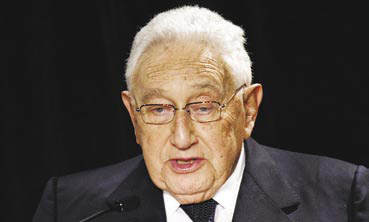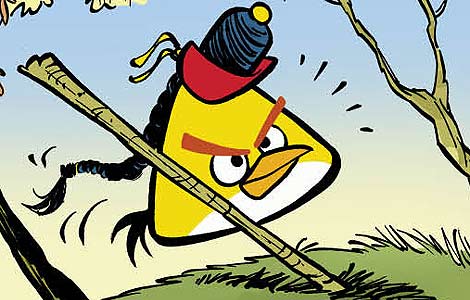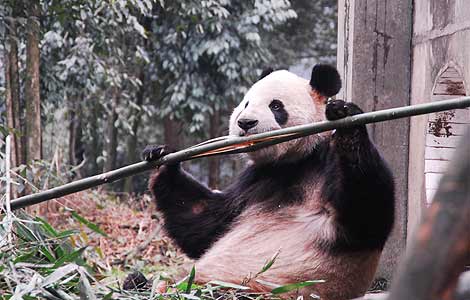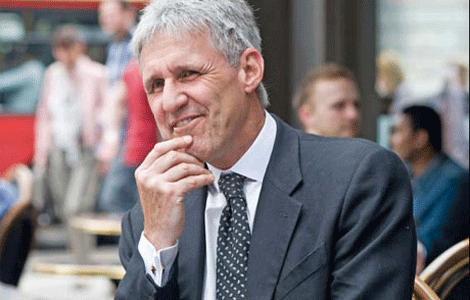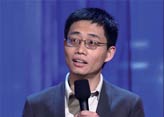Kissinger's book a warning to China, US
Updated: 2011-05-31 08:16
By Kelly Chung Dawson, Yan Yiqi and Lin Jing (China Daily)
|
|||||||||
|
|
NEW YORK / BEIJING - If there is something to offer a clue of how the world's two largest economies should handle their relations, former United States secretary of state Henry Kissinger's new book, On China, is that thing, Chinese and Western critics said.
Shi Qiping, a commentator with Phoenix TV in Hong Kong said: "Kissinger is a legendary figure. In the past, he has made many constructive suggestions, some of which have actually changed the history to some degree.
"Back in the US, he has gone through the presidency of 10 presidents, from Kennedy to today's Obama. In China, he has also witnessed the leadership shift of four generations. That experience helps him better understand the current global situation and where the world is heading for."
At the same time, the book also pointed out the potential risks of future Sino-US relations, which has also raised some concern.
"In this book, Kissinger says that right now China and the US are walking toward two extremes, which are quite different from the basic cultural recognition of these two countries," Shi said. "The huge gap between these two extremes would make a new round of Cold War or even war unavoidable. This should have enough attention from both countries and even the whole world."
Kwok Yat-ming, a commentator based in Hong Kong, said: "In his new book, Kissinger makes a conclusion that if a new round of Cold War breaks out between China and the US, it will impose negative influences on the development of a whole generation on both sides of the Pacific Ocean."
Kwok said as a senior statesman of the US, Kissinger is fully aware of this. And it is unlikely that the Obama administration would neglect it.
In the four decades since Kissinger's 1971 visit to China to re-establish contact after years of estrangement, much has changed in the global power structure.
China emerged from a painful isolation to become an economic powerhouse; and the US has been forced to re-examine its role in a world that has Westernized rapidly even as it becomes less Western-centric by the day.
In his new book, Kissinger explored the shifting relationship between the two nations, a tentatively pragmatic friendship that the former secretary of state under president Richard Nixon shaped over 40 years in his various roles as an adviser to the White House.
Despite his major contributions, Kissinger argued that the Chinese character - both in regards to foreign policy and culture - is tied to a history that preceded its relations with the US by several thousand years. Understanding the key differences between how each nation has been molded is crucial in navigating a tricky alliance that, regardless of his efforts, was always inevitable, he argued.
China and the US approach strategy in the same way that their most popular games do, he writes. Weiqi, or Go chess, as the 2,000-year-old Chinese game is known in America, "teaches the art of strategic encirclement", while the Western game of chess promotes the "concepts of 'center of gravity' and the 'decisive point'".
As such, "Chinese negotiators use diplomacy to weave together political, military, and psychological elements into an overall strategic design", while American diplomats "feel an obligation to break deadlocks with new proposals - unintentionally inviting new deadlocks to elicit new proposals".
Kissinger's key role in forging a relationship between the two countries has never been disputed, and his nuanced understanding of both cultures is evident everywhere in this ambitious, sweeping book.
Spanning both his four decades as an adviser to the White House and the long-scope of Chinese history, On China has been received largely positively by the Western media, which seems to uniformly acknowledge the weight of his expertise and experience.
Brett Stephens of The Wall Street Journal wrote: "Nobody living can claim greater credit than Mr. Kissinger for America's 1971 opening to Beijing ... and for China's subsequent opening to the world. So it's fitting that Mr. Kissinger has now written On China, a fluent, fascinating and sometimes infuriating book."
Newsweek's Niall Ferguson wrote: "On China, Kissinger's new book, is a reminder of why our leaders still want to pick his brains. Eighty-eight-years-old this month, he remains without equal as a strategic thinker."
"The most profound insights of On China are psychological," he continued. "They concern the fundamental cultural differences between a Chinese elite who can look back more than two millennia for inspiration and an American elite whose historical frame of reference is little more than two centuries old."
Several readers have pointed to the similarities between China's political philosophy and Kissinger's own espousal of realpolitik, the belief that politics should be dictated by practical and material factors rather than ideological or ethical objectives.
"When it comes to talking about Chinese leaders he has met, Mr. Kissinger, the hardheaded apostle of realpolitik, can sound almost starry-eyed," wrote Michiko Kakutani of The New York Times. "His sympathy for these leaders is not that surprising, giving his descriptions of them as practitioners of the same sort of unsentimental power politics he is famous for himself."
In fact, it is this sympathy that has garnered the book's main criticisms from a media that takes issue with Kissinger's reluctance to criticize China on the subject of human rights.
"In this book, Chinese leaders never sound unreasonable, but always sensible and pragmatic, unlike the Americans, who make unreasonable demands and have confused ideas about democracy and human rights," wrote Jasper Becker of the Guardian. "(Kissinger) gratefully accepts whatever the Chinese leaders tell him at face value."
China Daily
